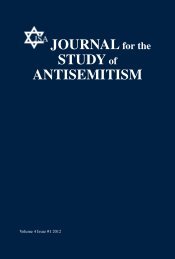Journal for the Study of Antisemitism
Journal for the Study of Antisemitism
Journal for the Study of Antisemitism
Create successful ePaper yourself
Turn your PDF publications into a flip-book with our unique Google optimized e-Paper software.
222 JOURNAL FOR THE STUDY OF ANTISEMITISM [ VOL. 1:209<br />
may serve as an example to show how youths can question antisemitism in<br />
<strong>the</strong> language. On <strong>the</strong> o<strong>the</strong>r hand, <strong>the</strong> interviewee is also an example <strong>of</strong> how<br />
naïve young people can be influenced by antisemitic language, searching<br />
<strong>for</strong> a rational reason regarding Jews’ being portrayed in a negative way. He<br />
said:<br />
I also heard that in our school. . . . But I didn’t understand why <strong>the</strong>y are<br />
saying “you Jew.” They were persecuted in Germany, killed, but that was<br />
also like religious discrepancy. O<strong>the</strong>rwise, in our school, in <strong>the</strong> chat<br />
<strong>the</strong>re’s always written “a Jew burns,” or something like that. There I have<br />
seen it. . . like name-calling, I have also heard <strong>of</strong>.<br />
Q: What do you think <strong>the</strong>n?<br />
Well if I haven’t experienced anything negative from <strong>the</strong> Jews, like <strong>the</strong>y<br />
didn’t harm me . . . I cannot abuse <strong>the</strong>m if I don’t know <strong>the</strong>m. But my<br />
friends do it sometimes but . . . <strong>the</strong>y just don’t know <strong>the</strong>m, <strong>the</strong>y don’t<br />
know us, ei<strong>the</strong>r. If <strong>the</strong>y have abused us . . . I wouldn’t like it ei<strong>the</strong>r. They<br />
don’t know us and we don’t know <strong>the</strong>m but we abuse <strong>the</strong>m. What <strong>the</strong>y do<br />
to us, I don’t know but. . . (Tayfun, Berlin, P13: 223-231)<br />
The question <strong>of</strong> <strong>the</strong> degree <strong>of</strong> individual responsibility and guilt <strong>for</strong> <strong>the</strong><br />
use <strong>of</strong> antisemitic language against <strong>the</strong> background <strong>of</strong> widespread<br />
antisemitism within <strong>the</strong> communication <strong>of</strong> <strong>the</strong> social circle remains difficult,<br />
as <strong>the</strong> group dynamics and functions <strong>of</strong> antisemitism need to be taken<br />
into consideration. However, <strong>the</strong> antisemitic language goes far beyond simply<br />
fulfilling group functions by voicing antisemitic resentments: The content<br />
is antisemitic—as will be shown in <strong>the</strong> following.<br />
ANTISEMITIC LANGUAGE AND ANTISEMITIC CONTENT<br />
The insult expresses <strong>the</strong> disgust, a <strong>for</strong>m <strong>of</strong> physical interiorization <strong>of</strong><br />
antisemitism.<br />
—Lapeyronnie 2005, 17, translated from <strong>the</strong> French by <strong>the</strong> author.<br />
We have seen that negative meanings <strong>of</strong> <strong>the</strong> terms <strong>for</strong> “Jew” are established<br />
in various ways through its pejorative usage. The negative connotations are<br />
trivialized and banalized to such an extent that one might think that <strong>the</strong><br />
terms <strong>for</strong> “Jew” and <strong>the</strong>ir negative meanings have nothing to do with “real<br />
Jews,” and thus its usage is not antisemitic. The use <strong>of</strong> <strong>the</strong> terms <strong>for</strong> “Jew”<br />
can be regarded as a metaphor. However, <strong>the</strong> choice <strong>of</strong> <strong>the</strong> metaphors we<br />
use is far from meaningless, as George Lak<strong>of</strong>f and Mark Johnson have<br />
shown on a general level. The metaphors we use both reveal and shape <strong>the</strong><br />
way we think (Lak<strong>of</strong>f and Johnson 2003). There<strong>for</strong>e, <strong>the</strong> pejorative usage <strong>of</strong><br />
<strong>the</strong> words <strong>for</strong> “Jew” cannot be separated from <strong>the</strong> general meaning <strong>of</strong> terms<br />
<strong>for</strong> “Jew” and thus reveal and transport antisemitic attitudes. Monika














